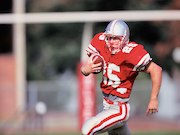Aortic root dilation, increased systolic BP, reduced diastolic and vascular function, LV hypertrophy
THURSDAY, March 1, 2018 (HealthDay News) — American-style football (ASF) athletes have cardiovascular changes indicative of increased cardiovascular risk, according to a study scheduled to be presented at the annual meeting of the American College of Cardiology, held from March 10 to 12 in Orlando, Fla.
Jonathan H. Kim, M.D., from Emory University in Atlanta, and colleagues studied freshman ASF participants and non-athletic undergraduate controls with repeated measures echocardiography and applanation tonometry before and after one competitive season. Data were analyzed for 136 ASF participants and 44 controls.
The researchers found that both groups had gained weight by post-season, but only ASF athletes demonstrated aortic root dilation, elevated systolic blood pressure (SBP), decreased diastolic and vascular function, and left ventricular (LV) hypertrophy. There were significant associations between post-season aortic root size and weight, SBP, pulse wave velocity (PWV), and LV diastolic tissue velocity in the total cohort. After adjustment for age, height, blood pressure, PWV, and pre-season aortic root size, there were independent associations for post-season weight and early diastolic mitral annular velocity with increased post-season aortic root size.
“We often think of football players, like all athletes, as the picture of health, but we’re gaining this body of knowledge that signals some maladaptive cardiovascular changes and potentially even early cardiac risk in some of these players,” Kim said in a statement.
Copyright © 2018 HealthDay. All rights reserved.








